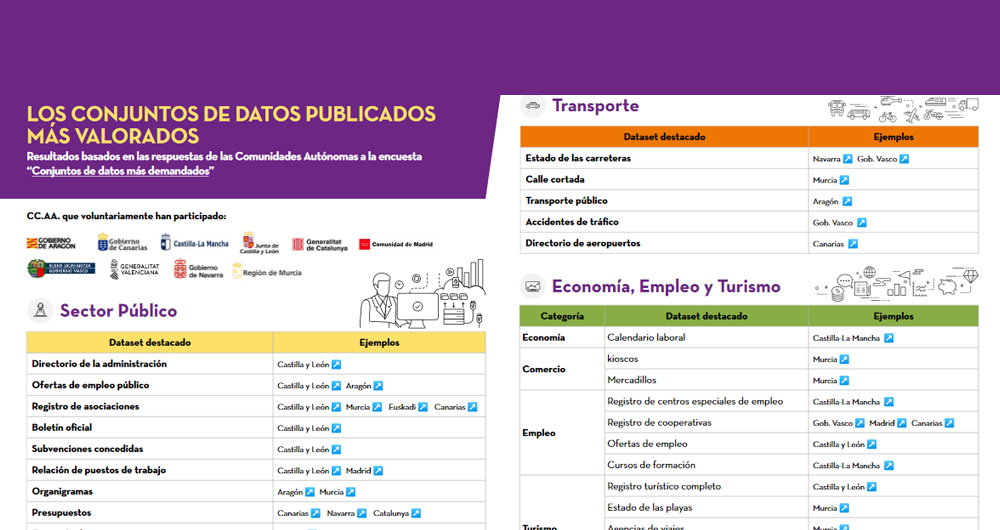Open data in local authorities: priorities and highlighted datasets
Fecha de la noticia: 30-09-2024

Local public bodies, such as county councils and municipalities, play a crucial role in opening their data to the public. Making data available to citizens not only builds trust in institutions, but also drives innovation, facilitates citizen participation and promotes informed decision-making. Through open data, these entities can contribute to a more efficient, collaborative and accountable management that is more responsive to the needs of society.
To find out about their activities and the most popular datasets, a survey was carried out last May in which more than 65 representatives of local authorities took part. Some of the conclusions drawn are summarised below.
Strategies to boost open data
Some municipalities have designed specific open data strategies tailored to their needs. This is the case of the city councils of Barakaldo, Pinto, Sant Feliu de Llobregat and Valencia, among others.
Other municipalities include the promotion of open data within broader strategic plans, such as Granada and its Strategic Plan for Innovation and SmartCity. In its strategic line number eight, the Granada City Council includes actions related to data governance and its data platform, focusing on the application of Open Data principles in the City Council and the public availability of municipal databases.
In addition, some city councils are going a step further, such as Alcobendas City Council, which is updating its open data strategy with a Data Governance strategy, focused on three axes (people, processes and technology), with which they seek to promote the data culture. Vitoria Gasteiz, for its part, is working on the constitution of a data office and the necessary infrastructure to support it, which will allow them to design a more general data strategy.
This is a path where the Provincial Councils have a lot to say, helping local councils to make progress in making data of interest available to citizens. One example is the Cordoba Provincial Council, which has launched a Public Sector Information Re-use Plan to promote the opening of data in a homogeneous way through its provincial smart platform and automated uploading. The provincial councils also promote open data through training, giving courses to public employees in the province. This has been done by the Salamanca and Cáceres Provincial Councils.
Provincial Council
Publishing open data is not enough if it is not updated in a continuous and timely manner. As a result, all respondents agree that updating their datasets is one of the most time and resource consuming tasks. Keeping open data up to date allows citizens, businesses and other stakeholders to access relevant and timely information, facilitating planning, research and the development of new solutions in a changing environment.
To this end, many respondents confirm that they carry out regular audits as well as inventories of databases - as, for example, the municipality of Quart de Poblet. These inventories are also being carried out in order to identify high-value data. This is the case of Valencia City Council, which is cataloguing current data and classifying them according to whether or not they belong to the so-called high-value categories.
In order to ensure that the data provided are up to date, many organisations are also promoting automation processes, such as the Diputación de Salamanca. By implementing automated systems, public bodies can ensure that data are continuously updated, reducing human error and optimising resources. In addition, it ensures that the information is the same on all of the organisation's portals.
In addition to continuous updating and improvement audits, the use of geospatial data enables local authorities to better understand their environment and make informed decisions. Publishing this type of data makes it possible to visualise the distribution of services, infrastructures, resources and problems in a territory, facilitating urban planning, environmental management and mobility, among other key aspects. In this sense, Spatial Data Infrastructures (SDI) continue to be developed at local level, such as the SDI of the Provincial Council of Guipuzcoa, or Geoportals such as that of the Provincial Council of Cordoba.
Another priority, indicated by Sant Feliu Town Council, is the incorporation of the gender perspective in data publications, whenever and wherever possible, with a double objective: to adequately highlight the differences and inequalities in the situation of women and, above all, to help define corrective public policies.
On the other hand, among the challenges, agencies highlight the technical difficulties in standardising and normalising data at the corporate level, often because information is isolated in silos. For this reason, they see the need to establish coordination mechanisms between areas and structures of data governance.
In addition, the organisations surveyed consider it necessary, in the first place, to promote the data culture within the organisation, by increasing human and technical resources and training.
Most popular datasets
The ultimate goal of open data portals is the re-use of data. In this sense, some of the mechanisms used by local authorities to monitor the use of their data are:
- View statistics on the most downloaded datasets. In this sense, the creation of interactive dashboards is being promoted, such as this one with access to all the datasets of the portals of local councils that use the AOC (Administració Oberta de Catalunya) consortium solution.
- Consultation of feedback and implementation of a rating system.
- Use of software observability platforms , based on artificial intelligence (AI) and automation, to monitor, analyse and optimise the user experience.
- Implementation of tools that generate popularity indexes.
- Creation of forms so that re-users can report on the products and services they develop using the portal's data, such as this example from the Cabildo de Tenerife.
Of all the datasets, the categories highlighted by the local authorities participating in the survey are the following:
Access the accessible version here
In short, local bodies' open data initiatives represent an invaluable opportunity to strengthen open data. Challenges remain, but the commitment to open data is a reality.















